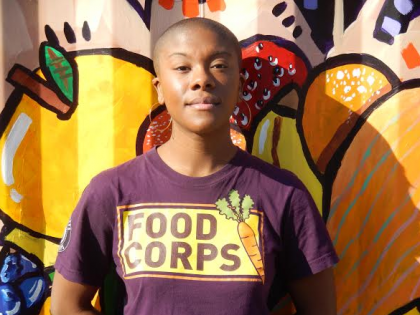Education is the gateway to food for so many of us, and Lauren is no exception. Lauren describes the alienation that so many of us feel when we attempt to make a difference in our own diets, by ourselves, and we couldn't agree more that every individual needs a 'tribe' to support them, and the food movement as a whole.
If you're interested in learning more about becoming a FoodCorps Service Member, click here! The deadline to apply for this year's program is Sunday, March 30th, 2014.
When did you know that you wanted to work in food?
I was never officially taught to cook, but I've always had a voracious appetite-especially for vegetables. In high school, I remember watching the Food Network for hours on end, and wanting so desperately to cook. And then one day, after lots of reading and lots of blaring smoke detectors, it just sort of happened.
Before devoting myself to working in health food, I worked in the arts-primarily as an arts educator and administrator. Admittedly, I spent a good bit of my time day dreaming about my next visit to the farmers market and sneaking off to read food blogs or to read the work of various food activists (some of my early favorites were and still are Bryant Terry, Meghan Telpner, Sarah Britton, A. Breeze Harper, Cathy Erway and many others). When I realized that although I loved art, it was no longer serving me, I started dipping my toes into food, little by little.
I think that like many people, the very real, very unglamorous reality of a quarter-life crisis is a good way to send you on a more exploratory path-a path that will ultimately lead you to something more fulfilling, something that makes you feel a bit more alive. This was my situation. When nothing feels right anymore, you have to figure out what does. There were little signs all around for quite some time that health food was the best fit-it just took me a while to figure it out.
How did you get your current good food job?
I learned about FoodCorps through Good Food Jobs, actually! (Editor's Note: We love when that happens!) From there, I scoured the internet for more information about the organization. It felt like a good fit, so I applied, and now I'm serving.
How did your previous work or life experience prepare you for a good food job?
My past as an arts educator has helped me tremendously as a food educator. I've been working in education in various capacities for a long time, and despite the fact that I've moved from the arts to food, the same skills are necessary.
Also, my academic background is in the arts, as well-specifically in Dance Studies and Cultural Studies. For me, studying theories of the body and theories of movement helped me to develop an interest in the factors (access, age, race, sexuality, gender, physical ability, etc.) that lead people to nourish their bodies in certain ways. In the near future, I'm interested in enrolling in a life coaching program and offering services that will allow me to coach women on developing skills to nourish and honor their bodies through healthy food and self-care practices.
What was the greatest obstacle you had to overcome in pursuing your Good Food Job dream?
In general, the health food, local food, and holistic health worlds are very White dominated. There are definitely some spectacular voices of color, but there are more voices of color out there that need to be heard and represented. Many healthy foods and holistic health practices emerge from communities of color and indigenous communities-these communities should be recognized and honored for that.
What can you identify as the greatest opportunities in food right now?
I'm seeing handfuls of people becoming holistic health coaches. I think that people are looking for a more personalized, more mindful approach to learning self-care practices. Quite often, when people are attempting to make positive changes in their dietary habits, they can't find the support that they need or are made to feel ashamed or embarrassed when they ask for help-that's where holistic health coaches come in.
Additionally, there is so much good, free information about food and health out there for people to take in. It's easy to feel lost in the sauce (or like you don't have a community or tribe) when you are attempting to make healthier choices, but there are so many people out there-people who don't even work in food-who have so much to share. YouTube, when used appropriately, is this vortex of smart, generous people who offer their time and knowledge-typically for free! When I'm not YouTubing baby animals and blooper reels, I'm typically YouTubing videos about vegetables.
If you could be compensated for your work with something other than money, what would it be?
Being compensated in leafy greens would be nice. My greens habit is getting pretty expensive.









